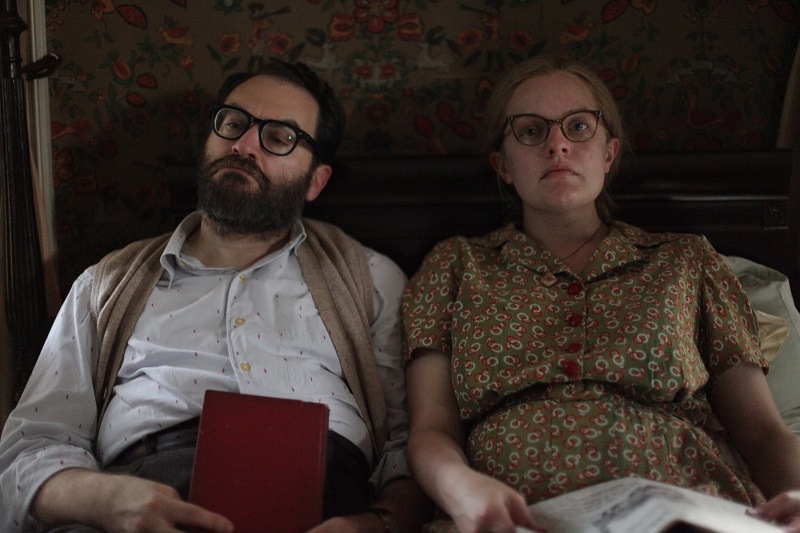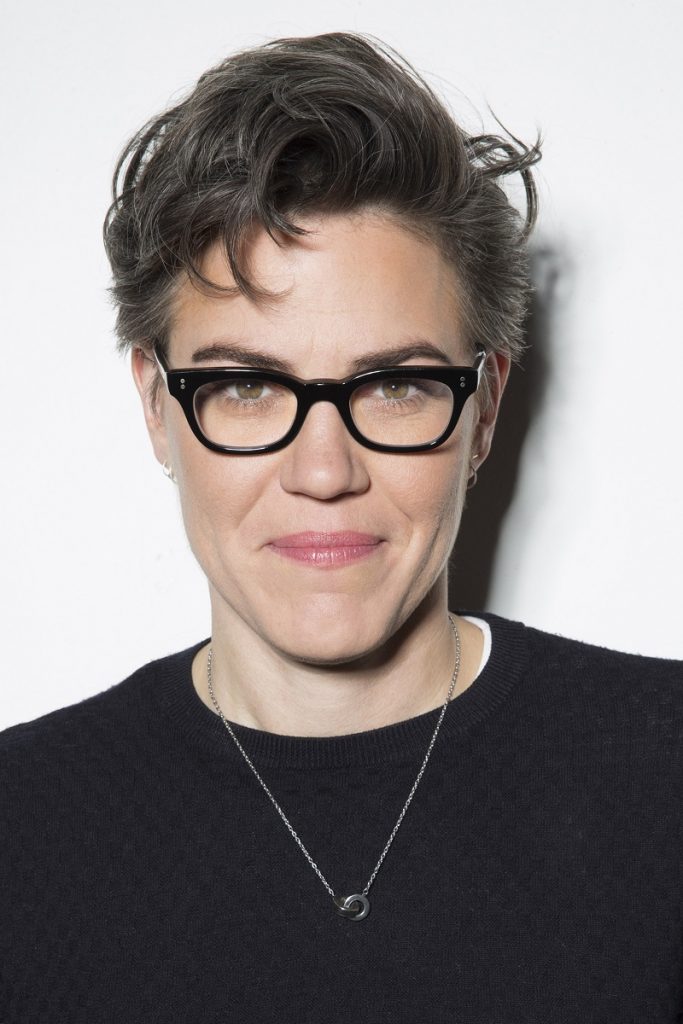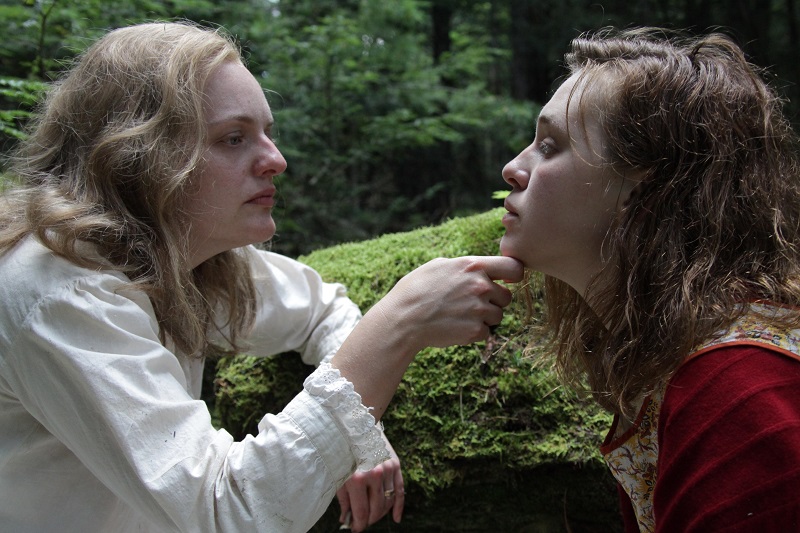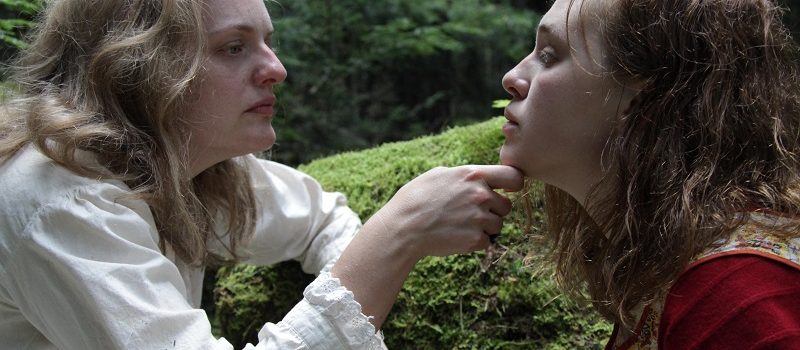An astonishing movie has arrived in the form of Shirley, telling a fictionalized story about famed horror writer Shirley Jackson (expertly played by Elisabeth Moss). Charged with bringing that tale to life was screenwriter Sarah Gubbins. She phoned The Movie Mensch for an exclusive chat where she chronicles the effort of writing about a writer that many think they know, but few can truly put a finger on the author’s pulse.

Shirley was volatile, had some mental issues, but above all else, she was one gifted wordsmith and her marriage to Stanley Hyman (Michael Stuhlbarg), a professor at a liberal arts Vermont college, was complicated. As portrayed in Shirley, the pair seemed to excel at getting under the other’s skin. Each was simultaneously wary of the other’s intellectual talents and feared being eclipsed by the other and passionately attracted to it like a moth to a flame.
When a young couple, Rose Nemser (Odessa Young) and Fred Nemser (Logan Lerman), move into their house as their guests, things get interesting. Fred is seeking to become a professor at the school like Stanley and will serve as his assistant, essentially, all while Rose seeks to enrich her education by attending the college. Instead, Rose winds up taking care of an oftentimes frail Shirley and completing household tasks that the lady of the house ignores. At first, she’s annoyed, but quickly, she’s drawn to her—fascinated by her and ultimately is serves to be integral to Shirley’s ability to pen to paper once again and create greatness.
Gubbins made her big screen debut with Shirley and was inspired to pen the script and to pay tribute to a wizard of language and the complexities that she wove through her work. Judging by what we see in the film (check out our “A” review), the author would be quite proud.
The Movie Mensch: First of all, thank you for taking the time to visit with me here today and congratulations on a big screen debut, as I understand.
Sarah Gubbins: It’s true.
The Movie Mensch: I was curious, there are various dramatic threads that permeate your script, but I wonder if there was an added challenge, or maybe it added enjoyment, writing a movie about a writer?
Sarah Gubbins: Yeah. I mean, it’s a dastardly idea, right? I mean, well, first of all, I don’t find writing a particularly dramatic thing and I don’t find it particularly interesting. I, like all writers, I’m sure you feel the same way, you love having written, but you hate writing. So, people say, “I love… I just had a great day of writing.” I’m like, “No, you had a great day because your writing is done.” But yeah, it was fun to be in conversation with Shirley’s work. And I think there was something… It almost felt like there was a… It was almost like being an archeological dig in some ways because I knew what she was going to get to. We have Hangsaman. And, then I also, reading her other stuff, was able to… Reading through all of her novels, see where some ideas that get started in that novel then kind of come to a bigger fruition or have a little bit more airtime.It’s like anything, you have tastes. And started to kind of identify what her tastes were, and really get inside her style in a way. But I think mainly there is this, she’s just a great observer of human subconscious and psychology. So, it was fun to try to chase that.
The Movie Mensch: What aspect of the Shirley story most resonated with you?
Sarah Gubbins: I had been a big Shirley Jackson fan since reading The Lottery, like most of us, and I think the novel provided this great entry point into having this character come and live with Shirley Jackson. And so, in some ways it was like, I felt definitely like Rose in the beginning. What would it be like, what would I imagine it would be like living with Shirley Jackson, having just known her through her work? And then you get to kind of subvert that. So, I think that with the novel really set that up. And then I basically went on to say like, “Okay, so what would it be like, not just to be living with Shirley Jackson, but living with Shirley Jackson right after The Lottery is published, right before she’s written this book that’s set in Bennington about a missing student and what it would be like to be there then.” And, so in some ways there’s like an imaginary friendship that we can feel. And I think that people, especially when you really do admire and respect a writer, you want to feel like your friendship is somehow influential, like that would just be an exceptional thing. I couldn’t even imagine if something I said or did made its way into a Shirley Jackson novel, but Rose is that person, you know?

The Movie Mensch: She is. And when you write a screenplay or anything like this, do you have certain actors in mind or is it kind of like the more of this generic person that you kind of create around?
Sarah Gubbins: I didn’t… I don’t… It depends. Sometimes, like when I was working on, I Love Dick, I knew that Kathryn Hahn was going to be playing Chris Kraus. And so, you’re writing for that. It’s very different. But Shirley, I was more concentrated on our fictionalization of the real life person. And, so, yeah, no, for this one, I definitely didn’t write with any actors in mind.
The Movie Mensch: Now, knowing that, and now that you’ve seen the film, what did she make of what Ms. Moss brought to the role?
Sarah Gubbins: In some moments, I couldn’t believe she wasn’t Shirley Jackson. I think what Elizabeth has is so perfectly aligned. I think she actually understands Shirley deeply. She’s very funny. She’s kind of a trickster. She’s a little misanthropic at moments. She’s very cut and dry and she’s also can be incredibly vulnerable in her performances. I think that Elizabeth really keyed into [that], and specifically the relationship, the complexities of the relationship with Stanley.
The Movie Mensch: Oh totally, they were just priceless to the entire endeavor.
Sarah Gubbins: I felt like the idea that Shirley and Stanley, at least in my imagination, really regarded each other so highly that they were constantly provoking each other. And sometimes I was intellectual and sometimes it was performative, and sometimes it was malevolent and sometimes it was magnificent. It was a dance that they were really doing their entire marriage. And I think it’s a highly unusual kind of pairing that those two had. It’s a real story that Stanley tells in the movie when he says he read Shirley Jackson and said, “I’m going to marry this woman.” And that’s their origin story too. So, I think him falling in love with her through her writing was so instrumental in the foundation of their relationship. And in many ways, is the reason that she was able to write and is also the reason that she was unable to write sometimes. So, I think Lizzie and Michael, first of all, they adore each other, and they have so much respect for each other. And I actually think that every time that they’re in a scene, they were making each other better because they would play in such a way that it was almost like… It was a well-intentioned boxing match in that they were kind of both stealing the scene back from the other person, but in a virtuosic way. They felt so comfortable and trusted the other so much that they could really be pushed. I can’t talk about Elizabeth’s performance without talking about Michael’s performance in many ways too, because I think even when he isn’t in those scenes with her, he’s a presence.

The Movie Mensch: I felt he was in her head.
Sarah Gubbins: Yeah. Yes! Absolutely.
The Movie Mensch: And vice versa.
Sarah Gubbins: Yep.
The Movie Mensch: Lastly, what was the working relationship like with director Josephine?
Sarah Gubbins: It was fantastic. I mean, Josephine has, like Shirley, has such an unexpected, both hilarious and kind of sometimes it’s merciful. It’s like a joyful way of seeing the world, but also can find things terrifying in the mundane, like Shirley. She’s not laden with any kind of cliched way about how things need to be done. So, she really, she gets filled with hauntings and she’s also ferocious about pushing things to pass a point of polite comfort. And I think that’s what we needed because that’s who Shirley is.

